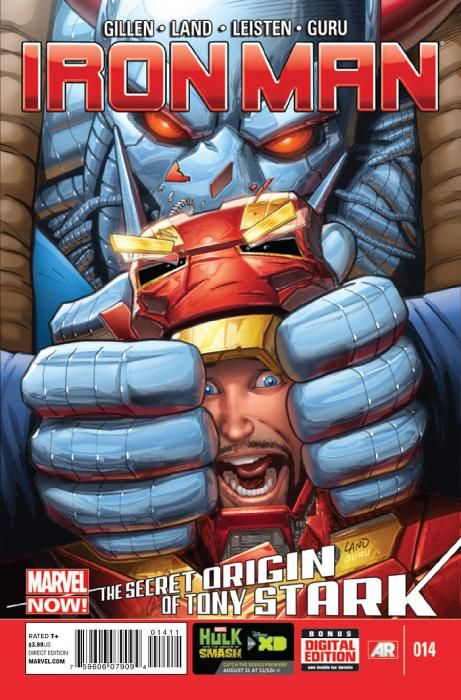"Iron Man" #14 by Kieron Gillen and Greg Land continues "The Secret Origin of Tony Stark: The Best Offense," as Tony tries to thwart Recorder 451's plan to install him as the driver of the Godkiller weapon.
With the revelations about Tony's birth out of the way, "Iron Man" #14 focuses on a struggle for Tony's future, with Recorder's 451's insisting on collecting on his long-ago deal with Daddy Stark. He's like an extraterrestrial Rumpelstiltskin coming to claim a first-born. Like that fairy tale villain, Recorder 451 is inhuman and unsympathetic, even if contract law would be on his side in theory. His appearance, impersonal name and his willingness to resort to force all support his evildoer status, even though Gillen gives him a somewhat sympathetic motive. The parable-like events in "Iron Man" #14 only reinforce Recorder 451's lack of moral depth as an opponent.
Gillen's direction of "Iron Man" into outer space in has created problems with characterization. Gillen keeps the tone light, and Death's Head and Recorder 451 have some funny lines, but they remain two-dimensional boogeymen. Frequently, Tony is the only human in a cast of aliens, robots and A.I.s. Out of all of them, he remains the only one that the reader can identify with. P.E.P.P.E.R. is supposed to be Tony's link to his terrestrial life and a personal touchstone, but the manufactured warmth of "her" presence in "Iron Man" #14 doesn't feel like a real dialogue or conversation between Tony and the real Pepper.
The story lacks a human touch, and this lack is particularly notable in the scene in "Iron Man" #14 in which an entire world is decimated. Unlike a similar scene in "Star Wars," it lacks any emotional impact whatsoever, since the inhabitants of Hope's Pustule aren't related to anyone the reader would care about. Even Gillen's name for this planet with its "millions of lives" shows that no one, not even the writer, takes it seriously.
Aliens are classically a device for writers to comment on xenophobia or primal human fears. Gillen has used aliens to expand the setting of territory of Stark's world, but he imbues them with neither pathos nor larger-than-life horror. Instead of a grander canvas, he has achieved the opposite effect of a claustrophobically small and empty space for Iron Man to work within. This atmosphere reinforces Tony's current "hands-tied" entrapment, but at the great price of diminishing his relevance as a hero.
Gillen's plot is mechanical in its suspense tactics and endgame. In "Iron Man" #14, Death's Head has some funny dialogue and then exits the stage with a classic antihero's grand gesture, but the only function of his appearance was to delay Recorder 451's inevitable coercion of Tony. Tony's first refusal to capitulate may be a small surprise, but the lazy last-page cliffhanger of "Iron Man" #14 is unoriginal and predictable.
However, Gillen's dialogue and plotting have worked better if Land's work in "Iron Man" #14 wasn't such a terrible counterpart to his storytelling, like a constantly out-of-step dance partner. Land's stiff faces look like masks, and his figures have no feeling of natural movement in the action scenes. Sure, Recorder 451 is an alien, but he is highly anthropomorphic -- barely distinguishable from human in body and facial configuration. His emotions and reactions should feel less plastic. It's even worse with Tony's face, where his grins and smirks feel distracting, inappropriate and off-putting, like a bad actor or poor voice dubbing. The words and images don't fit together, because Land's facial expressions don't do the job of being emotionally in sync with the events.

